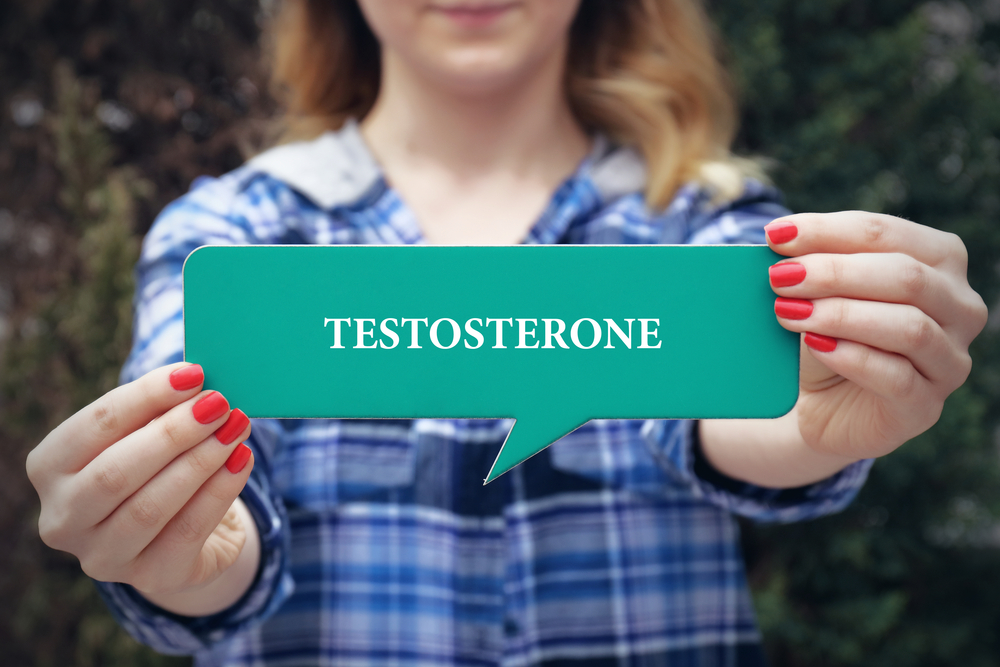Testosterone And Its Effect On Women


How Testosterone Affects Women
Testosterone is most commonly thought of as the male sex hormone, also known as an androgen. However, women’s bodies also have testosterone, and this hormone is incredibly important to women’s health. (1)
Women produce testosterone in their ovaries and adrenal glands. Women need smaller amounts of this androgen hormone than men, and keeping it in balance allows various aspects of women’s health to continue functioning well. (1)
Aspects of women’s health that are affected by testosterone levels include: (1, 2)
- bone health
- sex drive
- mood
- energy levels
- the ability to produce new blood cells
- reproduction
- cognitive health
Keep reading to learn how high and low testosterone levels affect women’s health, as well as how to manage your hormone levels to feel your best!
Low Testosterone in Women
Women’s testosterone levels naturally decrease between the ages of 20 and 40. By the time a woman turns 40 years old, her androgen hormone levels will be half what they once were. (1, 2)
For many women, menopause results in their ovaries producing fewer hormones overall. So it’s common for pre- and post-menopausal women to experience a drop in testosterone production. Some medications meant to counteract the effects of menopause can also decrease a woman’s testosterone levels. A common medication with this effect is oral estrogen. (2, 3)
But there are reasons besides aging that a woman’s testosterone production might decrease. If a woman’s adrenal glands are working insufficiently, they will be less capable of producing enough testosterone. Additionally, having an oophorectomy, or a removal of the ovaries, would seriously impact the ability to produce hormones. Some women also experience early menopause, which would decrease overall hormone levels earlier than expected. (2, 3)
Low testosterone levels can present many symptoms, including: (1, 2, 3)
- fatigue
- muscle weakness
- sleep issues
- weight gain
- irregular menstrual cycles
- decreased sex drive and sexual satisfaction
- vaginal dryness
- problems with fertility
- loss of bone density and increased risk of osteoporosis and fractures
- sluggishness
Many of the symptoms of low testosterone are common for other conditions for women, so a doctor will likely check for other issues before diagnosing low testosterone. If a doctor believes that low testosterone is causing these symptoms, they will order a blood test to check hormone levels. (2, 3)
High Testosterone in Women
When women have high testosterone levels, the cause is usually an underlying medical condition. The three most common causes of high testosterone in women are polycystic ovarian syndrome (PCOS), hirsutism, and congenital adrenal hyperplasia. (4, 5)
Polycystic Ovarian Syndrome (PCOS)
Polycystic Ovarian Syndrome affects between 8 and 20 percent of women of childbearing age globally. This hormonal disorder causes enlarged ovaries, which develop follicles and don’t release eggs regularly. Women with PCOS may also experience irregular or long menstrual periods and excessive body hair. (4, 5)
PCOS can also cause other health issues. These include: (4, 5)
- infertility
- miscarriage
- depression
- sleep apnea
- obesity
- type 2 diabetes
- heart disease
Hirsutism
Hirsutism is another hormonal condition in which women experience the growth of dark, coarse body hair on the back, face, and chest. Women with excessively high testosterone may also experience: (4, 5)
- deepened voice
- acne
- enlarged clitoris
- reduced breast size
- balding
- increased muscle mass
Congenital Adrenal Hyperplasia
Congenital adrenal hyperplasia (CAH) is a group of inherited disorders that affect the adrenal glands and, in turn, hormone production. CAH can cause an overproduction of testosterone. (4, 5)
Women with CAH may experience these symptoms: (4, 5)
- infertility
- deep voice
- severe acne
- early appearance of pubic hair
- facial hair
- excess body hair
- enlarged clitoris
- menstrual periods that are irregular or absent
In addition to the above conditions, high testosterone levels in women can cause further health issues, including: (1)
- high cholesterol
- high blood pressure
- heart disease
- insulin resistance
- diabetes
To diagnose high testosterone in women, a doctor will most likely perform a physical examination to look for common symptoms. Then, they will order a blood test to check hormone levels. The doctor may also recommend an ultrasound to look for PCOS. (5)
Treatment of high testosterone levels will depend on the condition causing them. A doctor may recommend medication and lifestyle changes, such as exercise and weight loss programs that can improve symptoms. Some women may also want to pursue the removal of unwanted body hair. (4, 5)
Managing Women’s Hormones
When it comes to managing their testosterone levels, some women consider testosterone therapy in the form of patches, gels, and creams. However, the Endocrine Society warns against using testosterone therapy for the treatment of the following conditions: (1)
- general wellbeing
- infertility
- cardiovascular health
- bone health
- cognitive function
- metabolic syndromes
- sexual dysfunction, other than in the case of hypoactive sexual desire disorder (HSDD)
If your doctor does prescribe testosterone therapy, you should be closely monitored with testosterone level testing every six months. This will help to avoid excess androgen hormones. The treatment should stop if you haven’t responded to the testosterone therapy after the first six months. (1)
Natural Hormone Management for Women
When your health issues have a hormonal origin, managing them can feel frustrating and even impossible. It may even feel as if your hormones have been hijacked. In order to feel better, regain your energy, and drop unwanted weight, you’ll need to take back control of your hormones!
Does this sound like you? Your body is working against you every step of the way…
…making you crave sugary, fatty foods.
…triggering emotional, binge eating.
…sabotaging your self-control.
…and hoarding your fat cells.
But I want you to know this, right here, right now:
…if you’ve ever felt guilty for snacking.
…if you’ve ever felt like a failure for quitting a diet.
…if you’ve ever felt like it’s impossible to lose more than a few pounds…
IT’S NOT YOUR FAULT!
The odds were stacked against you before you even started. However, there is finally good news! Thanks to a new breakthrough in the science of fat loss, you can naturally rebalance your hormones and end hormonal hijack — once and for all.
End Hormonal Hijack with just four fat-burning, anti-aging agents! The Happiness Hormones Method has been specifically designed for women over 40 so you can lose weight, eliminate stress and mood swings, and look and feel younger than your actual age. By taking back control of your hormones, you can take back control of your life.
Sources:
- https://www.everydayhealth.com/testosterone/womens-health/
- https://www.healthline.com/health/low-testosterone-in-women
- https://www.medicalnewstoday.com/articles/322663
- https://www.healthline.com/health/high-testosterone-in-women
- https://www.medicalnewstoday.com/articles/321292









